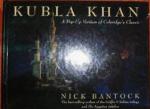|
This section contains 8,421 words (approx. 29 pages at 300 words per page) |

|
SOURCE: “Coleridge's Intellectual Intuition, the Vision of God, and the Walled Garden of ‘Kubla Khan,’” Journal of the History of Ideas, Vol. 59, No. 1, January, 1998, pp. 115-34.
In the following essay, Hedley discusses “Kubla Khan” as a poem written within the visionary mystical tradition that draws upon the central Christian image of the walled garden.
In his seminal work of 1917 Das Heilige Rudolph Otto quotes a number of passages as instances of the “Numinose.” Alongside those quotations from more conventional mystics, Plotinus, and Augustine, Otto refers to Coleridge's “savage place” in “Kubla Khan,”1 It is also pertinent that, when trying to define Romanticism, C. S. Lewis appeals to the longing for the “unnameable something” fired by “morning cobwebs in late summer” or the “opening lines of ‘Kubla Khan’.”2 Perhaps it is a mere coincidence that two of the most penetrating and influential scholars of religion in the twentieth century...
|
This section contains 8,421 words (approx. 29 pages at 300 words per page) |

|


